Produits
-

Elektor Digital Computer Vision (EN) PDF
Computer vision is probably the most exciting branch of image processing, and the number of applications in robotics, automation technology and quality control is constantly increasing. Unfortunately entering this research area is, as yet, not simple. Those who are interested must first go through a lot of books, publications and software libraries. With this book, however, the first step is easy. The theoretically founded content is understandable and is supplemented by many practical examples. Source code is provided with the specially developed platform-independent open source library IVT in the programming language C/C++. The use of the IVT is not necessary, but it does make for a much easier entry and allows first developments to be quickly produced. The authorship is made up of research assistants of the chair of Professor Ruediger Dillmann at the Institut für Technische Informatik (ITEC), Universitaet Karlsruhe (TH). Having gained extensive experience in image processing in many research and industrial projects, they are now passing this knowledge on. Among other subjects, the following are dealt with in the fundamentals section of the book: Lighting, optics, camera technology, transfer standards, camera calibration, image enhancement, segmentation, filters, correlation and stereo vision. The practical section provides the efficient implementation of the algorithms, followed by many interesting applications such as interior surveillance, bar code scanning, object recognition, 3-D scanning, 3-D tracking, a stereo camera system and much more.
€ 19,95
Membres € 15,96
-

Elektor Publishing Consumer Electronics Repair, Reuse and Recycling
A Combat Guide against E-waste and Throwawayism This book is for anyone who enjoys tinkering with analog and digital hardware electronics. Regardless of the sophistication of your workspace, only basic tools are required to achieve truly satisfying results. It is intended as a reference guide among other hardware repair publications you may have in your library. However, the book goes a step further than most other repair guides in addressing issues in the modern era of discarded electronics called e-waste. E-waste should be put to good use. Producing anything new requires not just precious resources and labor, but also energy to make and deliver it to global retail shelves. Your talents and love of electronics can be put to good use by rescuing and resurrecting at least selected units from this endless stream of e-waste. Examples include either restoring through repair, or salvaging reusable electronic and mechanical components for your next project. Smart tips are provided throughout the book, and much information is tabulated for easy reference. The book expands age-old repair and hacking techniques applied for repair on the workbench into clever methods and applications to achieve effective results with discarded or “non-servicable” electronic consumer products. The final chapter provides real-life examples using all of the previously discussed content in a summarized form for each example repair type.
€ 39,95
Membres € 35,96
-

Elektor Digital Consumer Electronics Repair, Reuse and Recycling (E-book)
A Combat Guide against E-waste and Throwawayism This book is for anyone who enjoys tinkering with analog and digital hardware electronics. Regardless of the sophistication of your workspace, only basic tools are required to achieve truly satisfying results. It is intended as a reference guide among other hardware repair publications you may have in your library. However, the book goes a step further than most other repair guides in addressing issues in the modern era of discarded electronics called e-waste. E-waste should be put to good use. Producing anything new requires not just precious resources and labor, but also energy to make and deliver it to global retail shelves. Your talents and love of electronics can be put to good use by rescuing and resurrecting at least selected units from this endless stream of e-waste. Examples include either restoring through repair, or salvaging reusable electronic and mechanical components for your next project. Smart tips are provided throughout the book, and much information is tabulated for easy reference. The book expands age-old repair and hacking techniques applied for repair on the workbench into clever methods and applications to achieve effective results with discarded or “non-servicable” electronic consumer products. The final chapter provides real-life examples using all of the previously discussed content in a summarized form for each example repair type.
€ 32,95
Membres € 26,36
-

Elektor Publishing Control Engineering with Fuzzy Logic
Practical Applications and Project with Arduino, ESP32, and RP2040 Immerse yourself in the fascinating world of control engineering with Arduino and ESP32! This book offers you a practical introduction to classic and modern control methods, including PID controllers, fuzzy logic, and sliding-mode controllers. In the first part, you will learn the basics of the popular Arduino controllers, such as the Arduino Uno and the ESP32, as well as the integration of sensors for temperature and pH measurement (NTC, PT100, PT1000, and pH sensor). You will learn how to use these sensors in various projects and how to visualize data on a Nextion TFT display. The course continues with an introduction to actuators such as MOSFET switches, H-bridges, and solid-state relays, which are used to control motors and actuators. You will learn to analyze and model controlled systems, including PT1 and PT2 control. The book focuses on the implementation of fuzzy and PID controllers for controlling temperature and DC motors. Both the Arduino Uno and the ESP32 are used. The sliding-mode controller is also introduced. In the second-to-last chapter, you will explore the basics of neural networks and learn how machine learning can be used on an Arduino. In the last chapter, there is a practical example of a fuzzy controller for feeding electricity into the household grid. This book is the perfect choice for engineers, students, and electronics engineers who want to expand their projects with innovative control techniques.
€ 44,95
Membres € 40,46
-

Elektor Digital Control Engineering with Fuzzy Logic (E-book)
Practical Applications and Project with Arduino, ESP32, and RP2040 Immerse yourself in the fascinating world of control engineering with Arduino and ESP32! This book offers you a practical introduction to classic and modern control methods, including PID controllers, fuzzy logic, and sliding-mode controllers. In the first part, you will learn the basics of the popular Arduino controllers, such as the Arduino Uno and the ESP32, as well as the integration of sensors for temperature and pH measurement (NTC, PT100, PT1000, and pH sensor). You will learn how to use these sensors in various projects and how to visualize data on a Nextion TFT display. The course continues with an introduction to actuators such as MOSFET switches, H-bridges, and solid-state relays, which are used to control motors and actuators. You will learn to analyze and model controlled systems, including PT1 and PT2 control. The book focuses on the implementation of fuzzy and PID controllers for controlling temperature and DC motors. Both the Arduino Uno and the ESP32 are used. The sliding-mode controller is also introduced. In the second-to-last chapter, you will explore the basics of neural networks and learn how machine learning can be used on an Arduino. In the last chapter, there is a practical example of a fuzzy controller for feeding electricity into the household grid. This book is the perfect choice for engineers, students, and electronics engineers who want to expand their projects with innovative control techniques.
€ 34,95
Membres € 27,96
-
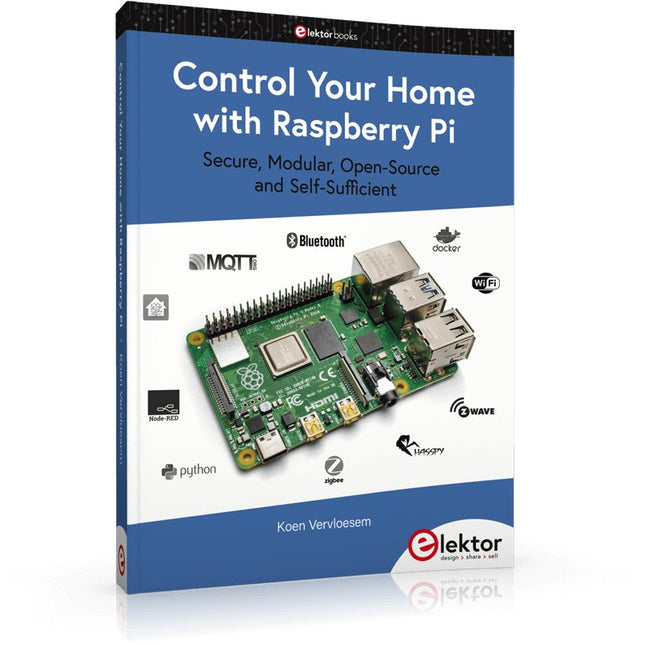
Elektor Publishing Control Your Home with Raspberry Pi
Secure, Modular, Open-Source and Self-Sufficient Ever since the Raspberry Pi was introduced, it has been used by enthusiasts to automate their homes. The Raspberry Pi is a powerful computer in a small package, with lots of interfacing options to control various devices. This book shows you how you can automate your home with a Raspberry Pi. You’ll learn how to use various wireless protocols for home automation, such as Bluetooth, 433.92 MHz radio waves, Z-Wave, and Zigbee. Soon you’ll automate your home with Python, Node-RED, and Home Assistant, and you’ll even be able to speak to your home automation system. All this is done securely, with a modular system, completely open-source, without relying on third-party services. You’re in control of your home, and no one else. At the end of this book, you can install and configure your Raspberry Pi as a highly flexible home automation gateway for protocols of your choice, and link various services with MQTT to make it your own system. This DIY (do it yourself) approach is a bit more laborious than just installing an off-the-shelf home automation system, but in the process, you can learn a lot, and in the end, you know exactly what’s running your house and how to tweak it. This is why you were interested in the Raspberry Pi in the first place, right? Turn your Raspberry Pi into a reliable gateway for various home automation protocols. Make your home automation setup reproducible with Docker Compose. Secure all your network communication with TLS. Create a video surveillance system for your home. Automate your home with Python, Node-RED, Home Assistant and AppDaemon. Securely access your home automation dashboard from remote locations. Use fully offline voice commands in your own language. Downloads Errata on GitHub
€ 44,95
Membres € 40,46
-
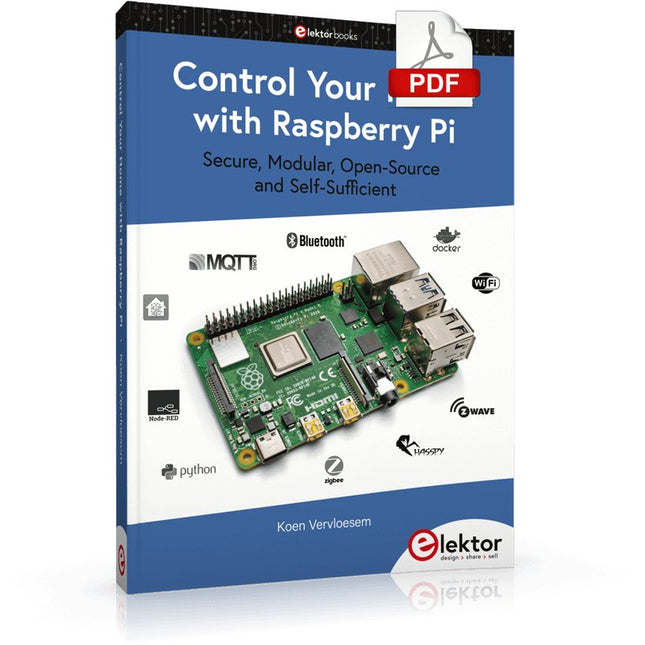
Elektor Digital Control Your Home with Raspberry Pi (E-book)
Secure, Modular, Open-Source and Self-Sufficient Ever since the Raspberry Pi was introduced, it has been used by enthusiasts to automate their homes. The Raspberry Pi is a powerful computer in a small package, with lots of interfacing options to control various devices. This book shows you how you can automate your home with a Raspberry Pi. You’ll learn how to use various wireless protocols for home automation, such as Bluetooth, 433.92 MHz radio waves, Z-Wave, and Zigbee. Soon you’ll automate your home with Python, Node-RED, and Home Assistant, and you’ll even be able to speak to your home automation system. All this is done securely, with a modular system, completely open-source, without relying on third-party services. You’re in control of your home, and no one else. At the end of this book, you can install and configure your Raspberry Pi as a highly flexible home automation gateway for protocols of your choice, and link various services with MQTT to make it your own system. This DIY (do it yourself) approach is a bit more laborious than just installing an off-the-shelf home automation system, but in the process, you can learn a lot, and in the end, you know exactly what’s running your house and how to tweak it. This is why you were interested in the Raspberry Pi in the first place, right? Turn your Raspberry Pi into a reliable gateway for various home automation protocols. Make your home automation setup reproducible with Docker Compose. Secure all your network communication with TLS. Create a video surveillance system for your home. Automate your home with Python, Node-RED, Home Assistant and AppDaemon. Securely access your home automation dashboard from remote locations. Use fully offline voice commands in your own language. Download the software and view the errata for the book on GitHub.
€ 34,95
Membres € 27,96
-

Elektor Digital Controller Area Network Projects (E-book)
The Controller Area Network (CAN) was originally developed to be used as a vehicle data bus system in passenger cars. Today, CAN controllers are available from over 20 manufacturers, and CAN is finding applications in other fields, such as medical, aerospace, process control, automation, and so on. This book is written for students, for practising engineers, for hobbyists, and for everyone else who may be interested to learn more about the CAN bus and its applications. The aim of this book is to teach you the basic principles of CAN networks and in addition the development of microcontroller based projects using the CAN bus. In summary, this book enables the reader to: Learn the theory of the CAN bus used in automotive industry Learn the principles, operation, and programming of microcontrollers Design complete microcontroller based projects using the C language Develop complete real CAN bus projects using microcontrollers Learn the principles of OBD systems used to debug vehicle electronics You will learn how to design microcontroller based CAN bus nodes, build a CAN bus, develop high-level programs, and then exchange data in real-time over the bus. You will also learn how to build microcontroller hardware and interface it to LEDs, LCDs, and A/D converters. The book assumes that the reader has some knowledge on basic electronics. Knowledge of the C programming language will be useful in later chapters of the book, and familiarity with at least one member of the PIC series of microcontrollers will be an advantage, especially if the reader intends to develop microcontroller based projects using the CAN bus.
€ 29,95
Membres € 23,96
-
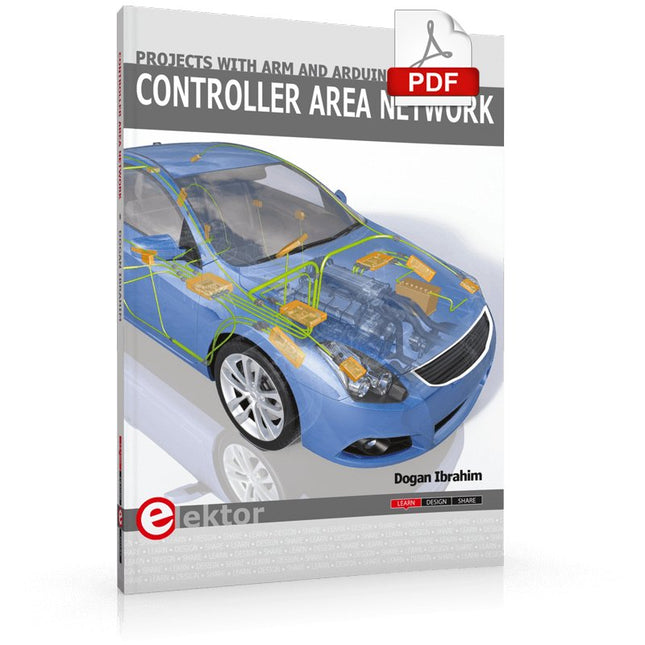
Elektor Digital Controller Area Network Projects with ARM and Arduino (E-book)
This book details the use of the ARM Cortex-M family of processors and the Arduino Uno in practical CAN bus based projects. Inside, it gives a detailed introduction to the architecture of the Cortex-M family whilst providing examples of popular hardware and software development kits. Using these kits helps to simplify the embedded design cycle considerably and makes it easier to develop, debug, and test a CAN bus based project. The architecture of the highly popular ARM Cortex-M processor STM32F407VGT6 is described at a high level by considering its various modules. In addition, the use of the mikroC Pro for ARM and Arduino Uno CAN bus library of functions are described in detail. This book is written for students, for practising engineers, for hobbyists, and for everyone else who may need to learn more about the CAN bus and its applications. The book assumes that the reader has some knowledge of basic electronics. Knowledge of the C programming language will be useful in later chapters of the book, and familiarity with at least one microcontroller will be an advantage, especially if the reader intends to develop microcontroller based projects using CAN bus. The book should be useful source of reference to anyone interested in finding an answer to one or more of the following questions: What bus systems are available for the automotive industry? What are the principles of the CAN bus? What types of frames (or data packets) are available in a CAN bus system? How can errors be detected in a CAN bus system and how reliable is a CAN bus system? What types of CAN bus controllers are there? What are the advantages of the ARM Cortex-M microcontrollers? How can one create a CAN bus project using an ARM microcontroller? How can one create a CAN bus project using an Arduino microcontroller? How can one monitor data on the CAN bus?
€ 32,95
Membres € 26,36
-

Elecrow CrowBot BOLT – Kit de voiture robot intelligent (avec joystick)
CrowBot BOLT est une voiture robot open source contrôlée par ESP32, intelligente, simple et facile à utiliser. Il est compatible avec les environnements Arduino et MicroPython, avec programmation graphique via Letscode. 16 parcours d'apprentissage avec des expériences intéressantes sont disponibles. Caractéristiques 16 leçons en trois langues (Letscode, Arduino, Micropython), apprentissage rapide et expériences amusantes Compatible avec Arduino, environnement de développement MicroPython, utilisant la programmation graphique Letscode, facile à utiliser Une forte évolutivité, avec une variété d'interfaces, peut être étendue et utilisée avec les modules Crowtail Une variété de modes de télécommande, vous pouvez utiliser la télécommande infrarouge et le joystick pour contrôler la voiture Spécifications Processeur ESP32-Wrover-B (8 Mo) La programmation Letscode, Arduino, Micropython Methode de CONTROLE Télécommande Bluetooth/télécommande infrarouge Saisir Bouton, capteur de lumière, module de réception infrarouge, capteur à ultrasons, capteur de suivi de ligne Sortir Buzzer, lumière RVB programmable, moteur Wi-Fi et Bluetooth Oui Capteur de lumière Peut réaliser la fonction de chasser la lumière ou d'éviter la lumière Capteur à ultrasons Lorsqu'un obstacle est détecté, l'itinéraire de conduite de la voiture peut être corrigé pour éviter l'obstacle Capteur de suivi de ligne Peut faire bouger la voiture le long des lignes sombres/noires, juger et corriger intelligemment le chemin de conduite Avertisseur sonore Peut faire sonner/siffler la voiture, apportant une expérience sensorielle plus directe Lumière RVB programmable Grâce à la programmation, il peut afficher des lumières colorées dans différentes scènes Récepteur infrarouge Recevez des signaux de télécommande infrarouge pour réaliser la télécommande Interfaces 1x USB-C, 1x I²C, 1x A/D Type de moteur Moteur à engrenages micro CC GA12-N20 Température de fonctionnement -10 ℃ ~ + 55 ℃ Source de courant 4 piles 1,5 V (non incluses) Vie de la batterie 1,5 heures Dimensions 128x92x64mm Poids 900g Inclus 1x châssis 1x capteur à ultrasons 1x support de batterie 2x roues 4x vis M3x8mm 2x colonne en cuivre M3x5 mm 2x plaques acryliques latérales 1x plaques acryliques avant 1x tournevis 2x câble Crowtail 4 broches 1x câble USB-C 1x télécommande infrarouge 1x instructions et carte du tracé de la ligne 1x Joystick Téléchargements Wiki CrowBot-BOLT_Assembly-Instruction Joystick-pour-CrowBot-BOLT_Assembly-Instruction CrowBot_BOLT_Beginner's_Guide Conception de documents ou CrowBot Conception de documents de joystick Code de leçon modèle 3D Code source d'usine
-

Elecrow Carte de dérivation GPS du module Crowtail-4G SIM A7670E
Ce module Crowtail 4G est un module sans fil LTE Cat1 haute performance. Il utilise le module de communication SIM A7670E de Simcom et communique via une interface UART, ce qui permet la transmission de données 4G et la communication vocale. Le module prend en charge plusieurs bandes LTE, dont B1/B3/B5/B7/B8/B20, ainsi que les réseaux WCDMA et GSM. De plus, il prend en charge divers protocoles tels que TCP/IP, FTP, HTTP, et plusieurs systèmes de navigation par satellite tels que GPS, GLONASS et BDS. Le module est doté d'une interface de chargement et peut être alimenté par une batterie lithium 3,7 V ou une interface USB-C 5 V. Il possède également une prise casque de 3,5 mm et en connectant un casque avec microphone, il peut être utilisé pour passer et recevoir des appels téléphoniques. Sa taille compacte facilite son intégration dans divers appareils IoT et répond à divers besoins d'application. De plus, sa faible consommation d'énergie et ses performances fiables sont également les raisons pour lesquelles il est largement utilisé dans les domaines de l'IoT, de la domotique, de l'automobile et du contrôle industriel. Caractéristiques Intégration du module de communication A7670E, permettant la transmission de données 4G et la communication vocale avec une faible consommation d'énergie et une grande fiabilité Prend en charge plusieurs bandes LTE, dont B1/B3/B5/B7/B8/B20, ainsi que les réseaux WCDMA et GSM Prise en charge de divers protocoles tels que TCP/IP, FTP, HTTP, et plusieurs systèmes de navigation par satellite tels que GPS, GLONASS et BDS Livrée avec une interface de chargement et une prise casque, qui peut être utilisée pour passer et recevoir des appels téléphoniques en connectant un casque avec microphone Petit mais puissant, sa taille compacte facilite son intégration dans divers appareils IoT Spécifications Puce principale : SIM A7670E LTE-FDD : B1/B3/B5/B7/B8/B20 GSM : 900/1800 MHz Classe de puissance GSM/GPRS EGSM900 : 4 (33 dBm ±2 dB) DCS1800 : 1 (30 dBm ±2 dB) Classe de puissance EDGE : EGSM900 : E2 (27 dBm ±3 dB) DCS1800 : E1 (26 dBm +3 dB/-4 dB) Classe de puissance LTE : 3 (23 dBm ±7 dB) Tension d'alimentation : 4 V ~ 4,2 V Consommation : 3,8 V LTE (Mbit/s) : 10 (DL)/5 (UL) GPRS/EDGE (Kbit/s) : 236,8 (DL)/236,8 (UL) Protocole : TCP/IP/IPV4/IPV6/Multi-PDP/FTP/FTPS /HTTP/HTTPS/DNS Interface de communication : USB / UART Mise à jour du firmware : USB/FOTA Types de répertoire téléphonique pris en charge : SM/FD/ON/AP/SDN Interfaces : 1x bouton d'alimentation, 1x BAT, 1x UART, 1x USB-C, 1x emplacement de carte SIM Dimensions : 35 x 50 mm Inclus 1x Crowtail-4G SIM-A7670E 1x Antenne 4G GSM NB-IoT 1x Antenne céramique GPS Téléchargements Wiki Manuel de commandes AT A7670 Fiche technique A7670 Code source
-

Elecrow Affichage tactile HD IPS CrowVi de 13,3 pouces (1920x1080)
De nos jours, de plus en plus de téléphones et d'ordinateurs portables intelligents adoptent des ports USB-C en raison de leur fonction puissante qui peut transmettre l'alimentation, les données et les informations vidéo. La solution USB-C peut également rendre l'appareil beaucoup plus fin par rapport au port Thunderbolt 3 ou HDMI-compatible. C'est pourquoi nous avons créé le moniteur portable USB-C CrowVi. Le super fin moniteur CrowVi de 13,3 pouces dispose de 2 ports USB-C, l'un est pour la livraison d'alimentation, et l'autre est pour la transmission de données vidéo et les commandes de l'écran tactile. L'écran peut également être connecté via le port mini HDMI-compatible. La résolution du CrowVi est de 1920x1080, ce qui offrira une meilleure expérience pour les jeux et la visualisation de films. Caractéristiques La coque du CrowVi est en alliage d'aluminium, son épaisseur est aussi fine que 5 mm, et le bord de l'écran est aussi étroit que 6 mm. L'ensemble du moniteur a un aspect exquis et élégant. Le CrowVi peut non seulement servir de double moniteur pour les smartphones et les ordinateurs portables, mais aussi de moniteur unique pour les dispositifs de jeu et certains ordinateurs centraux comme le Mac mini, le Raspberry Pi, etc. Le CrowVi vous offre une vue beaucoup plus grande par rapport au téléphone. Il permet de meilleures expériences pour les jeux et la visualisation de films. Spécifications Écran Écran LCD TFT IPS de 13,3 pouces Taille de l'écran 294,5 x 164 mm Épaisseur 5-10 mm Résolution 1920 x 1080 Luminosité 300 nits Taux de rafraîchissement 60 Hz Gamme de couleurs 16,7 millions, NTSC 72%, sRGB jusqu'à 100% Contraste 800:1 Rétroéclairage LED Angle de vision 178° Format d'image 16:9 Haut-parleur Deux haut-parleurs 8 ?, 2 W Coque Alliage d'aluminium Entrée Mini-HD, USB-C, PD Sortie Prise casque 3,5 mm Alimentation PD 5-20 V ou USB-C 3.0 Température de fonctionnement 0-50°C Dimensions 313 x 198 x 10 mm Poids (Étui intelligent) 350 g Poids (Moniteur) 700 g Inclus Moniteur tactile de 13,3 pouces Étui intelligent Câble USB-C vers USB-C (1 m) Câble d'alimentation USB-A vers USB-C (1 m) Câble HDMI vers mini-HDMI (1 m) Adaptateur d'alimentation (5 V/2 A) Adaptateur HDMI vers mini-HDMI Chiffon anti-poussière Manuel de l'utilisateur Téléchargements Manuel de l'utilisateur
-

Heltec Automation CubeCell HTCC-AB01 (V2) LoRa Development Board (EU868)
The CubeCell series is designed primarily for LoRa/LoRaWAN node applications. Built on the ASR605x platform (ASR6501, ASR6502), these chips integrate the PSoC 4000 series MCU (ARM Cortex-M0+ Core) with the SX1262 module. The CubeCell series offers seamless Arduino compatibility, stable LoRaWAN protocol operation, and straightforward connectivity with lithium batteries and solar panels. The HTCC-AB01 (V2) is an upgraded version of the HTCC-AB01 board. Features Arduino compatible Based on ASR605x (ASR6501, ASR6502), those chips are already integrated the PSoC 4000 series MCU (ARM Cortex-M0+ Core) and SX1262 LoRaWAN 1.0.2 support Ultra low power design, 3.5 uA in deep sleep Onboard SH1.25-2 battery interface, integrated lithium battery management system (charge and discharge management, overcharge protection, battery power detection, USB/battery power automatic switching) Good impendence matching and long communication distance. Onboard solar energy management system, can directly connect with a 5.5~7 V solar panel Micro USB interface with complete ESD protection, short circuit protection, RF shielding, and other protection measures Integrated CP2102 USB to serial port chip, convenient for program downloading, debugging information printing Specifications Main Chip ASR6502 (48 MHz ARM Cortex-M0+ MCU) LoRa Chipset SX1262 Frequency 863~870 MHz Max. TX Power 21 ±1 dBm Max. Receiving Sensitivity −134 dBm Hardware Resource 1x UART1x SPI1x I²C1x SWD1x 12-bit ADC input8-channel DMA engine8x GPIO2x PWM Memory 128 Kb FLASH16 Kb SRAM Power consumption Deep Sleep 3.5 uA Interfaces 1x USB-C1x LoRa Antenna (IPEX 1.0)SH1.25; 11x 2x 2.54 Pin header1x (2x 2.54 Pin header) Solar Energy VS pin can be connected to 5.5~7 V solar panel Battery 3.7 V Lithium battery (power supply and charging) Operating temperature −20~70°C Dimensions 40.6 x 22.9 x 7.6 mm Included 1x CubeCell HTCC-AB01 (V2) Development Board 1x Antenna 1x 2x SH1.25 battery connector Downloads Datasheet Schematic Quick start GitHub
-

Heltec Automation CubeCell HTCC-AB02 LoRa Development Board (EU868)
The CubeCell series is designed primarily for LoRa/LoRaWAN node applications. Built on the ASR605x platform (ASR6501, ASR6502), these chips integrate the PSoC 4000 series MCU (ARM Cortex-M0+ Core) with the SX1262 module. The CubeCell series offers seamless Arduino compatibility, stable LoRaWAN protocol operation, and straightforward connectivity with lithium batteries and solar panels. The HTCC-AB02 is a developer-friendly board, ideal for quickly testing and validating communication solutions. Features Arduino compatible Based on ASR605x (ASR6501, ASR6502), those chips are already integrated the PSoC 4000 series MCU (ARM Cortex M0+ Core) and SX1262 LoRaWAN 1.0.2 support Ultra low power design, 3.5 uA in deep sleep Onboard SH1.25-2 battery interface, integrated lithium battery management system (charge and discharge management, overcharge protection, battery power detection, USB/battery power automatic switching) Good impendence matching and long communication distance Onboard solar energy management system, can directly connect with a 5.5~7 V solar panel Micro USB interface with complete ESD protection, short circuit protection, RF shielding, and other protection measures Integrated CP2102 USB to serial port chip, convenient for program downloading, debugging information printing Onboard 0.96-inch 128x64 dot matrix OLED display, which can be used to display debugging information, battery power, and other information Specifications Main Chip ASR6502 (48 MHz ARM Cortex-M0+ MCU) LoRa Chipset SX1262 Frequency 863~870 MHz Max. TX Power 22 ±1 dBm Max. Receiving Sensitivity −135 dBm Hardware Resource 2x UART1x SPI2x I²C1x SWD3x 12-bit ADC input8-channel DMA engine16x GPIO Memory 128 Kb FLASH16 Kb SRAM Power consumption Deep sleep 3.5 uA Interfaces 1x Micro USB1x LoRa Antenna (IPEX)2x (15x 2.54 Pin header) + 3x (2x 2.54 Pin header) Battery 3.7 V lithium battery (power supply and charging) Solar Energy VS pin can be connected to 5.5~7 V solar panel USB to Serial Chip CP2102 Display 0.96" OLED (128 x 64) Operating temperature −20~70°C Dimensions 51.9 x 25 x 8 mm Included 1x CubeCell HTCC-AB02 Development Board 1x Antenna 1x 2x SH1.25 battery connector Downloads Datasheet Schematic Quick start GitHub
-
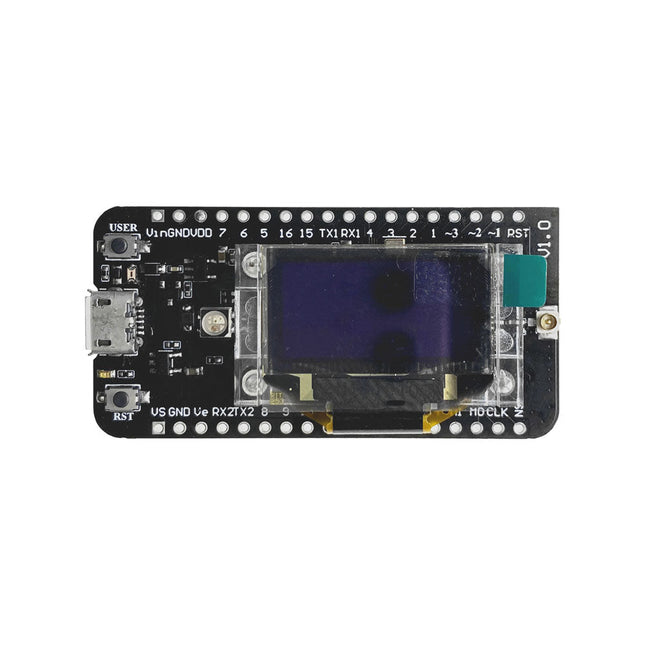
Heltec Automation CubeCell HTCC-AB02S LoRa Development Board with GPS (EU868)
The CubeCell series is designed primarily for LoRa/LoRaWAN node applications. Built on the ASR605x platform (ASR6501, ASR6502), these chips integrate the PSoC 4000 series MCU (ARM Cortex-M0+ Core) with the SX1262 module. The CubeCell series offers seamless Arduino compatibility, stable LoRaWAN protocol operation, and straightforward connectivity with lithium batteries and solar panels. The HTCC-AB02S is a developer-friendly board with an integrated AIR530Z GPS module, ideal for quickly testing and validating communication solutions. Features Arduino compatible Based on ASR605x (ASR6501, ASR6502), those chips are already integrated the PSoC 4000 series MCU (ARM Cortex M0+ Core) and SX1262 LoRaWAN 1.0.2 support Ultra low power design, 21 uA in deep sleep Onboard SH1.25-2 battery interface, integrated lithium battery management system (charge and discharge management, overcharge protection, battery power detection, USB/battery power automatic switching) Good impendence matching and long communication distance Onboard solar energy management system, can directly connect with a 5.5~7 V solar panel Micro USB interface with complete ESD protection, short circuit protection, RF shielding, and other protection measures Integrated CP2102 USB to serial port chip, convenient for program downloading, debugging information printing Onboard 0.96-inch 128x64 dot matrix OLED display, which can be used to display debugging information, battery power, and other information Using Air530 GPS module with GPS/Beidou Dual-mode position system support Specifications Main Chip ASR6502 (48 MHz ARM Cortex-M0+ MCU) LoRa Chipset SX1262 Frequency 863~870 MHz Max. TX Power 22 ±1 dBm Max. Receiving Sensitivity −135 dBm Hardware Resource 2x UART1x SPI2x I²C1x SWD3x 12-bit ADC input8-channel DMA engine16x GPIO Memory 128 Kb FLASH16 Kb SRAM Power consumption Deep sleep 21 uA Interfaces 1x Micro USB1x LoRa Antenna (IPEX)2x (15x 2.54 Pin header) + 3x (2x 2.54 Pin header) Battery 3.7 V lithium battery (power supply and charging) Solar Energy VS pin can be connected to 5.5~7 V solar panel USB to Serial Chip CP2102 Display 0.96" OLED (128 x 64) Operating temperature −20~70°C Dimensions 55.9 x 27.9 x 9.5 mm Included 1x CubeCell HTCC-AB02S Development Board 1x Antenna 1x 2x SH1.25 battery connector Downloads Datasheet Schematic GPS module (Manual) Quick start GitHub
€ 49,95€ 24,95
Membres identique
-
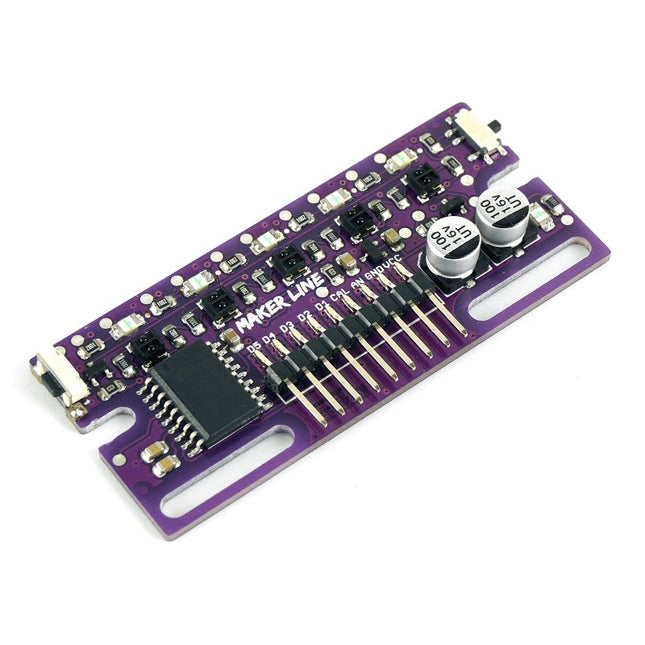
Cytron Capteur de ligne Cytron Maker
Maker Line est un capteur de ligne doté d'un réseau de 5 capteurs IR capable de suivre des lignes de 13 mm à 30 mm de largeur. L'étalonnage du capteur a également été simplifié. Il n'est pas nécessaire d'ajuster le potentiomètre pour chaque capteur IR. Il vous suffit d'appuyer sur le bouton de calibrage pendant 2 secondes pour accéder au mode de calibrage. Ensuite, vous devez faire glisser les capteurs sur la ligne, appuyer à nouveau sur le bouton et vous êtes prêt à partir. Les données d'étalonnage sont stockées dans l'EEPROM et restent intactes même lorsque le capteur est éteint. L'étalonnage ne doit donc être effectué qu'une seule fois, sauf si la hauteur du capteur, la couleur de la ligne ou la couleur de fond ont changé. Maker Line prend également en charge deux sorties : 5 sorties numériques pour l'état de chaque capteur indépendamment, ce qui est similaire au capteur IR classique, mais vous bénéficiez d'un étalonnage facile, et également une sortie analogique, où la tension représente la position de la ligne. La sortie analogique offre également une résolution plus élevée par rapport aux sorties numériques séparées. Ceci est particulièrement utile lorsqu’une grande précision est requise lors de la construction d’un robot suiveur de ligne avec contrôle PID. Caractéristiques Tension de fonctionnement : compatible DC 3,3 V et 5 V (avec protection contre l'inversion de polarité) Largeur de trait recommandée : 13 mm à 30 mm Couleur de ligne sélectionnable (claire ou foncée) Distance du capteur (hauteur) : 4 mm à 40 mm (Vcc = 5 V, ligne noire sur surface blanche) Taux de rafraîchissement du capteur : 200 Hz Processus d'étalonnage facile Types de sortie double : 5 sorties numériques représentent chaque état du capteur IR, 1 sortie analogique représente la position de la ligne. Prend en charge une large gamme de contrôleurs, tels que Arduino, Raspberry Pi, etc. Téléchargements Fiche de données Tutoriel : Construire un robot de suivi de ligne bon marché
€ 14,95€ 7,50
Membres identique
-
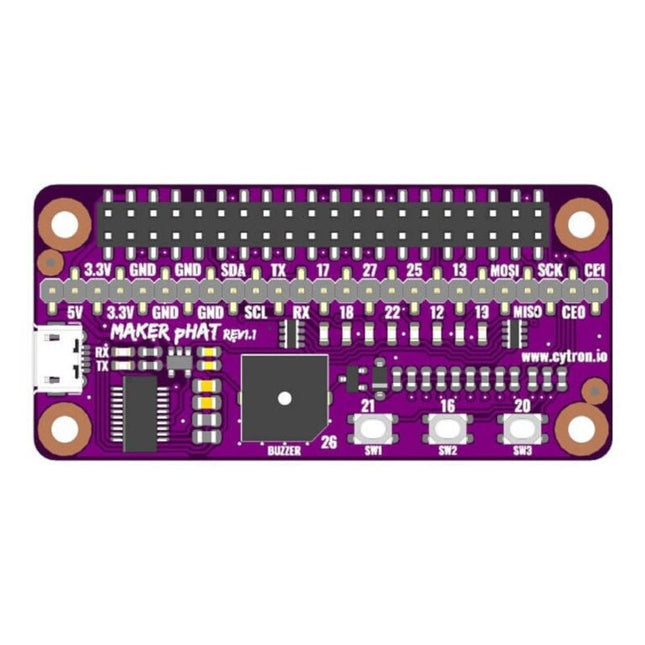
Cytron Cytron Maker pHAT pour Raspberry Pi
Le Maker pHAT est la solution aux problèmes les plus courants auxquels les débutants sont confrontés en commençant par Raspberry PI. Sa conception intelligente et simple facilite sa fixation sur votre Pi et vous évite tout le travail fastidieux de connexion de divers autres accessoires. De plus, les LED correspondant à chaque broche permettent de voir extrêmement facilement où se situe un problème potentiel. Le Maker pHat a la même taille que le Raspberry Pi Zero avec les 4 trous de montage alignés. Cependant, il peut être utilisé avec les Raspberry Pi 3B, 3B+ et 3A+, en insérant un en-tête d'empilage 2 x 20. Caractéristiques Taille Raspberry Pi Zero, s'empile parfaitement sur Raspberry Pi Zero Compatible avec Raspberry Pi 3B / 3B+ de taille standard, Raspberry Pi 3A+ de taille moyenne et Raspberry Pi Zero / W / WH de taille plus petite. Empreinte GPIO Raspberry Pi standard. Réseau de LED pour les broches GPIO sélectionnées (GPIO 17, 18, 27, 22, 25, 12, 13, 19). 3x boutons-poussoirs programmables intégrés (GPIO 21, 19 et 20, doivent être configurés comme entrée pull up). Buzzer actif intégré (GPIO 26). Étiquettes appropriées pour tous les GPIO, y compris SPI, UART, I2C, 5V, 3,3V et GND. Utilisez la prise USB Micro-B pour l’entrée 5 V et la communication USB vers UART. Série USB facilitée par le FT231X Tension d'entrée : USB 5 V, depuis un ordinateur, une banque d'alimentation ou un adaptateur USB standard.
€ 14,95€ 7,50
Membres identique
-
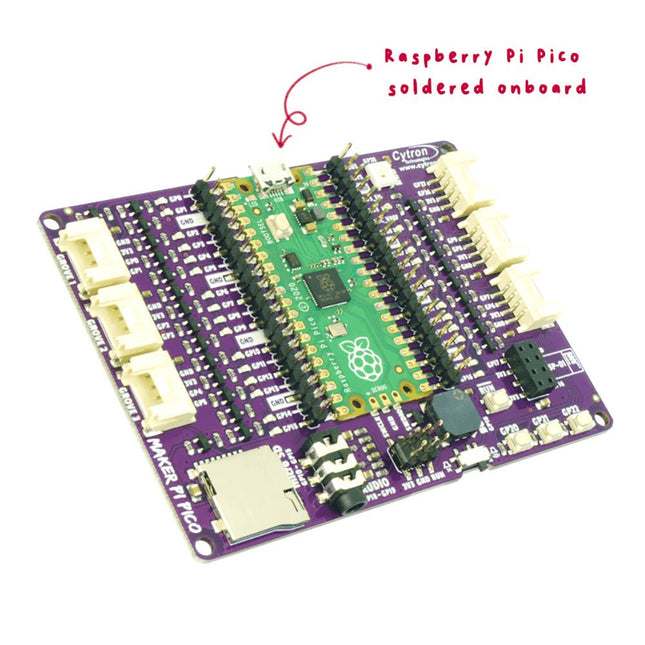
Cytron Cytron Maker Pi Pico (avec Raspberry Pi Pico prémonté)
Le Cytron Maker Pi Pico (avec Raspberry Pi Pico RP2040 soudé sur la carte) intègre les fonctionnalités les plus recherchées pour votre Raspberry Pi Pico et vous donne accès à toutes les broches GPIO sur deux connecteurs à 20 voies, avec des étiquettes claires. Chaque GPIO est associée à un indicateur LED pour faciliter le test et le débogage du code. Le diagramme de brochage indiquant la fonction de chaque broche est imprimé sur la face inférieure de la carte. Fonctions Fonctionne dès la sortie de la boîte. Pas de soudures à faire ! Accès à toutes les broches du Raspberry Pi Pico sur deux connecteurs de 20 voies. Indicateurs LED sur tous les connecteurs GPIO 3x bouton poussoir programmable (GP20-22) 1x LED RVB - NeoPixel (GP28) 1x buzzer piézoélectrique (GP18) 1x prise audio stéréo 3,5 mm (GP18-19) 1x connecteur pour carte Micro SD (GP10-15) 1x connecteur ESP-01 (GP16-17) 6x port Grove Spécifications Coeur 2x ARM Cortex-M0+ 32 bits Horloge du CPU 48 MHz, jusqu'à 133 MHz Taille de la flash Flash Q-SPI de 2 MByte Langage de programmation MicroPython, C++ Alimentation de la carte 5 VCC via MicroUSB Alimentation alternative de la carte 2-5 VCC via le connecteur VSYS (broche 39) Tension de l’unité centrale 3,3 VCC Tension GPIO 3,3 VCC Interface USB Hôte USB 1.1 Changement de programme MicroUSB, stockage de masse USB GPIO 26x Entrée/Sortie ADC 3x 12-bit 500 ksps Capteur de témpérature Intégré, 12 bits UART 2x UART I²C 2x I²C SPI 2x SPI PWM 16x PWM Minuterie 1x Minuterie avec 4 x Alarme Horloge temps réel 1x Horloge temps réel PIO 2x E/S haute vitesse programmables LED embarquée 1x LED programmable Bouton intégré 1x Bouton BOOTSEL
€ 24,95€ 12,50
Membres identique
-
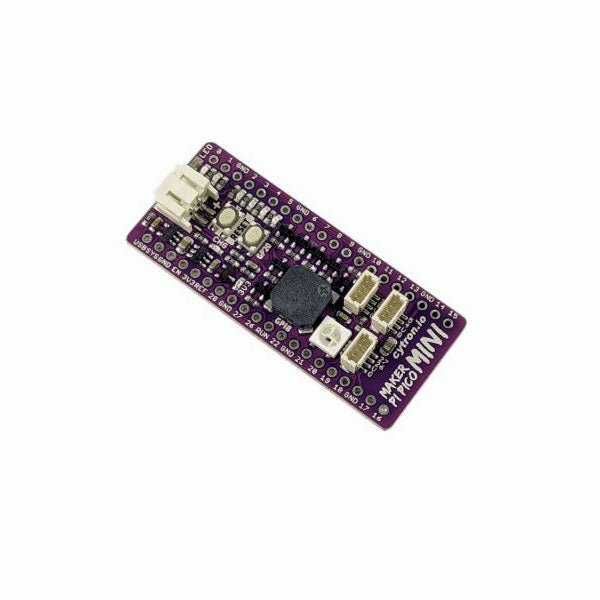
Cytron Cytron Maker Pi Pico Mini W (avec Raspberry Pi Pico W pré-soudé et CircuitPython préchargé)
Vous aimez le Cytron Maker Pi Pico (SKU 19706) mais vous ne pouvez pas l'intégrer à votre projet ? Il y a maintenant le Cytron Maker Pi Pico Mini W. Basé sur le Raspberry Pi Pico W, il a également hérité de la plupart des fonctionnalités utiles de son grand frère comme les LED d'état GPIO, les LED RGB WS2812B Neopixel, le buzzer piézo passif, sans oublier le bouton utilisateur et le bouton de réinitialisation. Caractéristiques Basé sur Raspberry Pi Pico W Connecteur LiPo monocellulaire avec circuit de protection contre la surcharge et la surdécharge, rechargeable via USB. 6x LED d'indication d'état pour les GPIO 1x Buzzer piézo passif (capable de jouer un son musical ou une mélodie) 1x Bouton de réinitialisation 1x Bouton programmable par l'utilisateur 1x LED RGB (WS2812B Neopixel) 3x Ports Maker, compatible avec Qwiic, STEMMA QT, et Grove (via un câble de conversion) Compatible avec Arduino IDE, CircuitPython et MicroPython Dimensions : 23.12 x 53.85 mm Inclus 1x Maker Pi Pico Mini W (Raspberry Pi Pico W pré-soudé avec CircuitPython préchargé) 3x Câble Grove vers JST-SH (Qwiic / STEMMA QT) Téléchargements Fiche technique Maker Pi Pico Schéma Maker Pi Pico Mini Maker Pi Pico Mini Schéma de câblage Page officiel du Raspberry Pi Pico Démarrer avec le Raspberry Pi Pico CircuitPython pour Raspberry Pi Pico Fiche technique Raspberry Pi Pico Fiche technique RP2040 SDK Python pour Raspberry Pi Pico SDK C/C++ pour Raspberry Pi Pico
€ 19,95€ 9,95
Membres identique
-
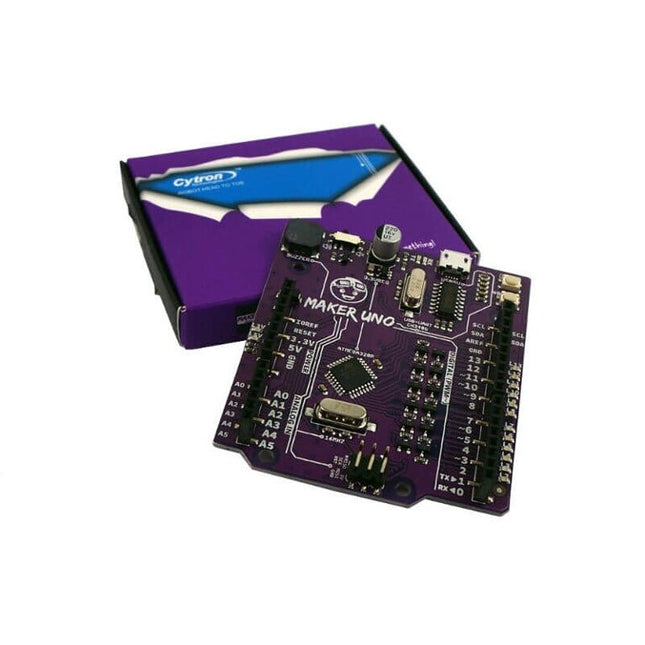
Cytron Fabricant de Cytron Uno
Les fonctions Pie Buzzer : agit comme une simple sortie audio Port micro-USB Bouton programmable 12 x LED : fournit une sortie visuelle à bord Caractéristiques Microcontrôleur ATmega328P Programme IDE EDI Arduino Tension de fonctionnement 5 V E/S numériques 20 MLI 6 Entrée analogique 6 (10 bits) UART 1 IPS 1 I2C 1 Interruption externe 2 Mémoire flash 32 Ko SRAM 2 Ko EEPROM/Flash de données 1 Ko Vitesse de l'horloge 16 MHz Broche d'E/S d'alimentation CC 20mA Source de courant USB uniquement Courant continu pour 5 V Source USB Courant continu pour 3,3 V 500mA Puce USB vers série CH340G LED programmable 12 sur les broches numériques 2 à 13 Bouton-poussoir programmable 1 sur la broche numérique 2 Buzzer à tarte 1 sur la broche numérique 8 Arduino contre Maker Uno
€ 14,95
Membres € 13,46
-
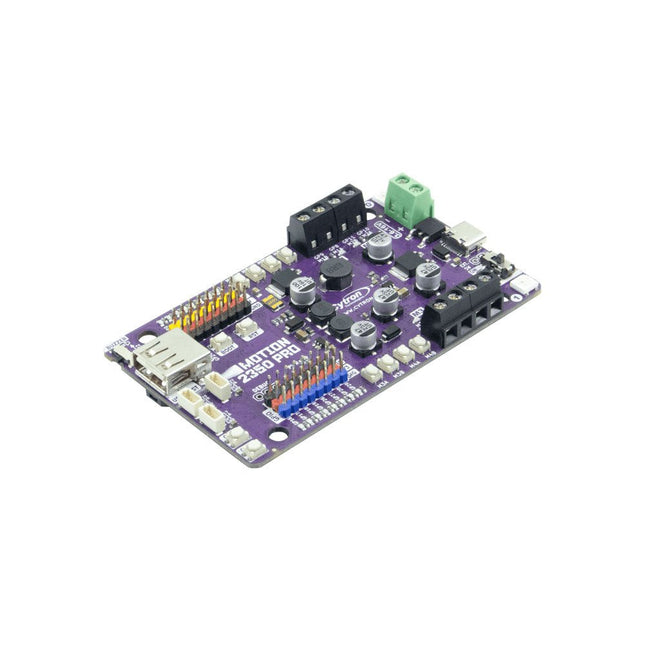
Cytron Cytron Motion 2350 Pro contrôleur robotique
Le Cytron Motion 2350 Pro est un pilote de moteur CC à 4 canaux robuste (3 A par canal, 3,6-16 V) idéal pour construire des robots puissants, y compris des conceptions à roues mécanique. Il comprend des ports servo 5 V à 8 canaux, des sorties GPIO à 8 canaux, 3 ports Maker et un hôte USB pour une prise en charge plug-and-play des joysticks/manettes de jeu. Propulsé par Raspberry Pi Pico 2, il s'intègre parfaitement à l'écosystème Pico, prenant en charge Python (MicroPython, CircuitPython), C/C++ et Arduino IDE. Préinstallé avec CircuitPython, il est livré avec un programme de démonstration et des boutons de test rapide pour une utilisation immédiate. Connectez-vous simplement via USB-C et commencez à explorer ! Inclus 1x Cytron Motion 2350 Pro contrôleur robotique 1x Câble STEMMA QT/Qwiic JST SH à 4 broches avec prises femelles (150 mm) 2x Câbles Grove vers JST-SH (200 mm) 1x Jeu de pare-chocs en silicone 4x Broches de friction pour blocs de construction 1x Mini-tournevis
€ 29,95€ 14,95
Membres identique
-
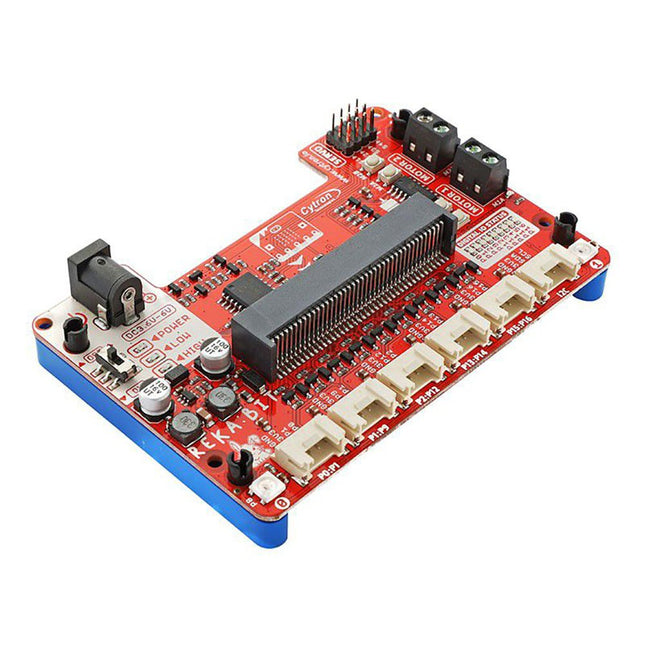
Cytron Cytron REKA:BIT – Robotique avec micro:bit
Programmez votre REKA:BIT avec Microsoft MakeCode Editor . Ajoutez simplement l'extension REKA:BIT MakeCode et vous êtes prêt à partir. Si vous êtes débutant, vous pouvez commencer par le mode de programmation par blocs ; faites simplement glisser, déposez et assemblez les blocs de codage. Pour les utilisateurs plus avancés, vous pouvez facilement passer en mode JavaScript ou Python sur MakeCode Editor pour la programmation textuelle. REKA:BIT possède de nombreux voyants LED pour vous aider dans votre codage et votre dépannage. Il couvre les broches IO connectées aux six ports Grove et aux sorties du moteur CC du coprocesseur. On peut facilement vérifier son programme et la connexion de son circuit en surveillant ces LED. En outre, REKA:BIT dispose également d'un indicateur marche/arrêt, de LED de sous-tension et de surtension intégrées pour donner des avertissements appropriés en cas de problème avec l'entrée d'alimentation. REKA:BIT dispose d'un coprocesseur pour gérer le multitâche plus efficacement. Jouer de la musique tout en contrôlant jusqu'à 4 servomoteurs et 2 moteurs à courant continu, animer une matrice de LED micro:bit et même éclairer des LED RVB de différentes couleurs, le tout en même temps, n'est pas un problème pour REKA:BIT. Caractéristiques 2x bornes de moteur à courant continu Boutons de test rapide du moteur intégrés (aucun codage nécessaire) 4x ports pour servomoteur 2x LED RVB Neopixel 6x ports Grove (3,3 V) 3x entrées analogiques/ports IO numériques 2x ports E/S numériques 1x interface I²C Prise DC pour entrée d'alimentation (3,6 - 6 VDC) Bouton ON / OFF Indicateur de mise sous tension Indicateur et protection de sous-tension (FAIBLE) Indicateur et protection de surtension (HAUTE) Dimensions : 10,4 x 72 x 15 mm Inclus 1x carte d'extension REKA:BIT 1x câble d'alimentation et de données USB 1x support de pile 4xAA 1x Mini tournevis 3x câble Grove vers connecteur femelle 2x bloc de construction 1x9 bras de levage 4x goupilles de friction pour blocs de construction Attention : carte micro:bit non incluse
€ 22,95€ 11,50
Membres identique
-

DER EE LCR-mètre (100 kHz) DER EE DE-5000
Le testeur DE-5000 est un appareil de mesure des composants LCR (inductances, condensateurs et résistances), intelligent, de haute précision, portable, d’utilisation facile et flexible. Il permet la vérification automatique des composants LCR et la mesure des résistances selon la méthode Kelvin à 4 fils. Il possède un écran rétroéclairé de 19999/1999 incréments, de multiples modes de mesure et permet la sélection de la fréquence de test (100 Hz, 120 Hz, 1 kHz, 10 kHz ou 100 kHz). Le LCR-mètre DE-5000 est un appareil apportant une aide significative aux ingénieurs et techniciens. Caractéristiques Vérification automatique des composants L.C.R. Mesures Ls/Lp/Cs/Cp/Rs/Rp/DCR avec D/Q/θ/ESR Mesures selon la méthode Kelvin à 4 fils Afficheurs 20000 / 2000 incréments Rétroéclairage Mode relatif Modes Série / Parallèle Fonctionnalité de tri de composants Indicateur de pile faible Arrêt automatique Spécifications Fréquence de test 100 Hz / 120 Hz / 1 kHz / 10 kHz / 100 kHz Gamme de résistance 20,000 Ω – 200,0 MΩ Gamme DCR 200,00 Ω – 200,0 MΩ Gamme capacitance 200,00 pF – 20,00 mF Gamme inductance 20,000 µH – 2,000 KH Afficheur LCD rétroéclairé 19999 / 1999 incréments Tolérance sélectionnable ±0,25%, ±0,5%, ±1%, ±2%, ±5%, ±10%, ±20% Alimentation Pile 9 V Dimensions 188 x 95 x 52 mm Poids 350 g (sans la pile) Inclus LCR-mètre DE-5000 Étui des fils de tests avec pinces crocodiles (TL-21) Adaptateur CA/CC Ligne de protection (TL-23) Brucelles CMS (TL-22) Pile 9 V Étui de transport Notice Téléchargements Datasheet
-

DER EE DER EE DE-5050 Testeur d'isolation
Le testeur d'isolation DE-5050 est un instrument polyvalent conçu pour mesurer la résistance d'isolation, la faible résistance et la tension CA/CC. Ses fonctionnalités conviviales le rendent adapté à diverses applications de tests électriques. Caractéristiques Propose cinq tensions de test sélectionnables pour différentes exigences de test Détecte automatiquement la tension CA/CC et affiche la fréquence lorsque la tension CA dépasse 10 V Stocke jusqu'à 100 ensembles de résultats de tests avec date et heure S'éteint automatiquement après 10 minutes d'inactivité Équipé d'un écran rétroéclairé Permet le réglage du zéro pour les mesures de faible résistance Calcul et affichage automatiques du Dielectric Absorption Ratio (DAR) et de la Polarization Index (PI) lors du test de résistance d'isolement Spécifications Tension de test 50 V, 100 V/125 V, 250 V, 500 V, 1000 V Plage de résistance d'isolation Jusqu'à 20 GΩ à 500 VJusqu'à 40 GΩ à 1000 V Précision des mesures de tension ±1% de la lecture±4dgt (onde sinusoïdale) Dimensions 160 x 100 x 46 mm Poids 380 g (hors piles) Téléchargements Datasheet























